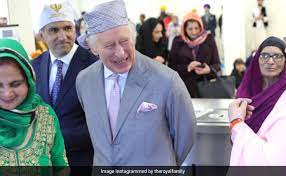Tags

In a recent Spectator article, Dan Hitchens raises an issue our own Nicholas has in his comments – will the Church of England hold together? On a wider sphere, will the Anglican communion? If we go further and look at what has been happening in Germany over the “Synodical way” which may well involve the German Bishops moving in what might (without too much mischief) be called an Anglican point of view – that is to accommodating same-sex marriage and the idea of women being priests, we witness the same phenomenon. On top of these epiphenomena of the culture wars, comes the further complication of “imperialism,” and “cultural superiority.” Churches (both Anglican and Catholic) in Africa and other parts of what used to be called “the Third World,” are markedly more conservative and traditional on such issues – which raises the question from which many liberals shy away – is the attempt to advance issues of such concern in the West a form of cultural imperialism which ignores local cultural norms?
It is, of course, a sign of the times in which we live, and its culture, that the issues which divide Christians should be same-sex marriage, and other, gender-related problems. But that should not surprise us. The Church(es) have always argued, and the idea of some perfect era of unity is a myth. From the arguments in the earliest church over the nature of Christ, through to the schisms produced in the fifth and eleventh centuries by Christological arguments, to those caused in the sixteenth century by the question of authority, and to more recent ones over interpretation of doctrine, Christians have seldom managed to live at peace with each other or the spirit of the age. Naturally, Christian leaders want “unity,” but there is always, in that, the danger pointed to by Hitchens in his piece:
Where did it all go wrong? How in the past ten years have the divisions in Anglicanism and Catholicism only deepened under two leaders once championed as unifiers? Both men have sometimes spoken as though the truth is a secondary matter for Christians, less important than a spirit of inclusivity, and have acted as though, with enough cheerfulness, common sense and bureaucratic reform, some middle path could be found.
Spectator, 8/4/23
The search for some “middle way,” in politics or other areas of secular life is generally regarded as a good idea, but when it comes to Christianity there can be a problem. Jesus is either Lord, or He is not; He is either the Way, the Truth and the Life, or He is not. The test here, for Christians, is whether any “compromise,” is about that issue of supreme importance; on that there is no “middle way.” But before we agree to agree, let us ask a few awkward questions.
The Christian Churches themselves are divided, and despite all attempts at ecumenism, they are no more united now than when such efforts began. Indeed one might almost be tempted to say Christians are no more united now than they were in its early days. But what the Anglican Church has learned, and what, I think the Roman Catholic Church under Pope Francis is trying to learn, is the art of “disagreeing with courtesy” over “inessentials,” while trying to agree on “essentials.”
That, of course, in itself, raises the issues of what is an is not an “essential.” We have “Bible believing” Christians asserting that their own interpretation of Scripture is more reliable and authoritative than that of the Church which gave them that Bible, as though Christians in other Churches do not also use reason to interpret. But to perch on a one-legged stool is to risk the iron entering into the soul. That same tradition which tells us what the Bible is, provides invaluable resources in its interpretation. That same Church which gave us the Bible is an invaluable guide in helping us to understand it. If “I” am essential to my own understanding of Scripture, I am not self-sufficient. Original Sin (the one Christian teaching that can be verified by a look in the mirror) means I will go wrong, left to my own reason; Tradition and the Church will help keep me on the right path.
Is that, then, a “middle way?” It inevitably involves my wrestling with my own assumptions. How much easier it would be to surround myself with my own infallible interpretations. I could just have stopped thinking about topics such as women’s ordination. But how much would I have missed? The female Anglican priests I have met have shown all the signs of being good fruit and added so much to the ministry of the Anglican Church. I don’t want, here, to rehearse the old arguments – those who wish to rest on certain intepretations of a few texts and on tradition will do so, as is their right. But to argue from that, that those who take the other position are some kind of “heretic,” is to ignore the way in which the Holy Spirit is working in the Anglican Church. If, “by their fruits shall ye know them,” has anything to be said for it, then it is hard to argue that the experience of women priests suggests that the Anglicans (and others) took a wrong turn.
The way the Church of England dealt with that issue could almost be a case study in how to find a middle way – and annoy those who do not want one. Those clergy who objected were allowed to have a bishop of their own who agreed with their position, but all ordinands had to agree that women could be priests. Some objected to the whole thing and left, some objected to any allowance being made and stayed and noisily objected, allowing those who stayed to have a nice argument with them. Neither extreme was happy, but then that is the nature of extremes.
We have yet to see whether the Cornonation will be an example of finding a middle way acceptable to most. But to assume, at this point, with just rumour to go on, that the Archbishop will compromise on the essential – that Christ is Lord – is more a product of suspicion and fear than of inside knowledge. When we see the Liturgy, we shall know more



You must be logged in to post a comment.